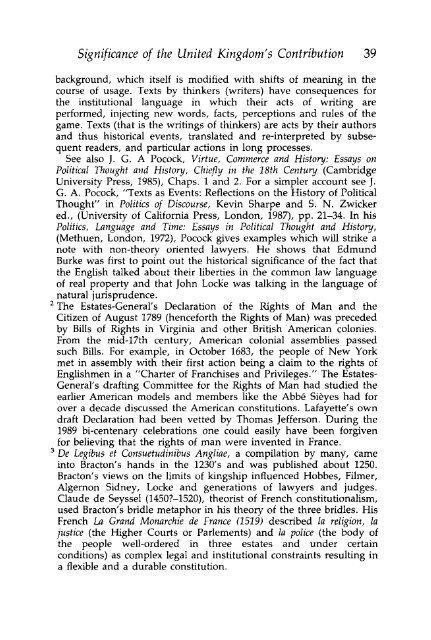The United Kingdom and Human Rights - College of Social ...
The United Kingdom and Human Rights - College of Social ...
The United Kingdom and Human Rights - College of Social ...
You also want an ePaper? Increase the reach of your titles
YUMPU automatically turns print PDFs into web optimized ePapers that Google loves.
Significance <strong>of</strong> the <strong>United</strong> <strong>Kingdom</strong>'s Contribution 39<br />
background, which itself is modified with shifts <strong>of</strong> meaning in the<br />
course <strong>of</strong> usage. Texts by thinkers (writers) have consequences for<br />
the institutional language in which their acts <strong>of</strong> writing are<br />
performed, injecting new words, facts, perceptions <strong>and</strong> rules <strong>of</strong> the<br />
game. Texts (that is the writings <strong>of</strong> thinkers) are acts by their authors<br />
<strong>and</strong> thus historical events, translated <strong>and</strong> re-interpreted by subsequent<br />
readers, <strong>and</strong> particular actions in long processes.<br />
See also J. G. A Pocock, Virtue, Commerce <strong>and</strong> History: Essays on<br />
Political Thought <strong>and</strong> History, Chiefly in the 18th Century (Cambridge<br />
University Press, 1985), Chaps. 1 <strong>and</strong> 2. For a simpler account see J.<br />
G. A. Pocock, "Texts as Events: Reflections on the History <strong>of</strong> Political<br />
Thought" in Politics <strong>of</strong> Discourse, Kevin Sharpe <strong>and</strong> S. N. Zwicker<br />
ed., (University <strong>of</strong> California Press, London, 1987), pp. 21-34. In his<br />
Politics, Language <strong>and</strong> Time: Essays in Political Thought <strong>and</strong> History,<br />
(Methuen, London, 1972), Pocock gives examples which will strike a<br />
note with non-theory oriented lawyers. He shows that Edmund<br />
Burke was first to point out the historical significance <strong>of</strong> the fact that<br />
the English talked about their liberties in the common law language<br />
<strong>of</strong> real property <strong>and</strong> that John Locke was talking in the language <strong>of</strong><br />
natural jurisprudence.<br />
2 <strong>The</strong> Estates-General's Declaration <strong>of</strong> the <strong>Rights</strong> <strong>of</strong> Man <strong>and</strong> the<br />
Citizen <strong>of</strong> August 1789 (henceforth the <strong>Rights</strong> <strong>of</strong> Man) was preceded<br />
by Bills <strong>of</strong> <strong>Rights</strong> in Virginia <strong>and</strong> other British American colonies.<br />
From the mid-17th century, American colonial assemblies passed<br />
such Bills. For example, in October 1683, the people <strong>of</strong> New York<br />
met in assembly with their first action being a claim to the rights <strong>of</strong><br />
Englishmen in a "Charter <strong>of</strong> Franchises <strong>and</strong> Privileges." <strong>The</strong> Estates-<br />
General's drafting Committee for the <strong>Rights</strong> <strong>of</strong> Man had studied the<br />
earlier American models <strong>and</strong> members like the Abbe Sieyes had for<br />
over a decade discussed the American constitutions. Lafayette's own<br />
draft Declaration had been vetted by Thomas Jefferson. During the<br />
1989 bi-centenary celebrations one could easily have been forgiven<br />
for believing that the rights <strong>of</strong> man were invented in France.<br />
3 De Legibus el Consuetudinibus Angliae, a compilation by many, came<br />
into Bracton's h<strong>and</strong>s in the 1230's <strong>and</strong> was published about 1250.<br />
Bracton's views on the limits <strong>of</strong> kingship influenced Hobbes, Firmer,<br />
Algernon Sidney, Locke <strong>and</strong> generations <strong>of</strong> lawyers <strong>and</strong> judges.<br />
Claude de Seyssel (14507-1520), theorist <strong>of</strong> French constitutionalism,<br />
used Bracton's bridle metaphor in his theory <strong>of</strong> the three bridles. His<br />
French La Gr<strong>and</strong> Monarchie de Trance (1519) described la religion, la<br />
justice (the Higher Courts or Parlements) <strong>and</strong> la police (the body <strong>of</strong><br />
the people well-ordered in three estates <strong>and</strong> under certain<br />
conditions) as complex legal <strong>and</strong> institutional constraints resulting in<br />
a flexible <strong>and</strong> a durable constitution.

















